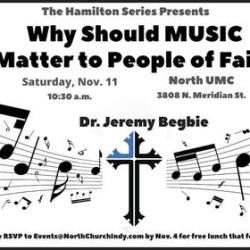One of the things that I love about teaching my course on the Bible and music is how much I learn from my students. This year has been no exception. Even the things that they simply identify as relevant and bring up in class suggest new avenues of research, whether of the sort that would be enough for a blog post, or of the sort that might lead to an article or book.
I confess that, despite how many countless times I must have heard the song “We Are The World,” I had not noticed how profoundly religious its lyrics are. And I had not noticed that it makes reference to turning stones to bread.
An online article suggests that this is simply a factual error of a kind that is common in song lyrics. After all, in “Do They Know It’s Christmas?” there is blunder after blunder, since people in Africa have known it was Christmas since long before the English were converted to Christianity for the first time, and the continent has rivers, vegetation, and yes even snow. Why should this follow-up fund-raising song not also have at least one major blunder in it too? As Gavin Edwards wrote in Rolling Stone:
With a squint, Nelson delivers the oddest line in the song: “As God has shown us, by turning stone to bread.” Actually, there is no Biblical passage where God transforms stone to bread, although He gets a shout-out for bringing forth all food from the Earth in Psalms 104. In Matthew 4, however, the Devil comes to Jesus Christ in the desert after he’s been fasting for 40 days, and trying to tempt him, tells him that he should change the stones into bread. Christ spurns him with the aphorism “Man shall not live on bread alone.” So the Bible seems to be against turning stone into bread (not that it comes up often as an option in most people’s lives). In Lipstick Traces, Greil Marcus writes about John of Leyden, who in 1535 told the people of Munster, Germany, suffering from a blockade, that God would turn the city’s cobblestones into bread. People tried to eat the cobblestones, and found that they were not feeling groovy. The bottom line: when people are suffering from famine, it seems cruel to bring up the possibility of stones being edible.
Eric Mataxas has also commented on it, and thinks it is evidence of the profound ignorance of the Bible among secular pop stars. However, given that the main lyricist was Michael Jackson, who was raised as a Jehovah’s Witness, I’m not convinced that this was simply a mistake. If we take a look at what that organization has to say about the passage in Matthew 4, we read things like “Knowing that it is wrong to use his miraculous powers to satisfy his personal desires, Jesus rejects that temptation.” I suspect that many would view the multiplication of the loaves and fishes as precisely the same sort of miracle – except aimed at taking care of others, and therefore appropriate.
And so I think that this may not be a mistake, but something else. Perhaps it is an effort to connect biblical imagery of the provision of abundance of food with the need to turn stony ground in an area of famine into something else. But it definitely seems to be intentional rather than a blunder. In which case, my thinking is that it probably represents the conviction that, since Jesus said that God is a loving father, and even a human father would not give his child who asks for bread a stone, that God does this miracle, and the issue in Jesus’ temptation was the timing and motivation rather than the appropriateness of the action per se.
What do you think?













